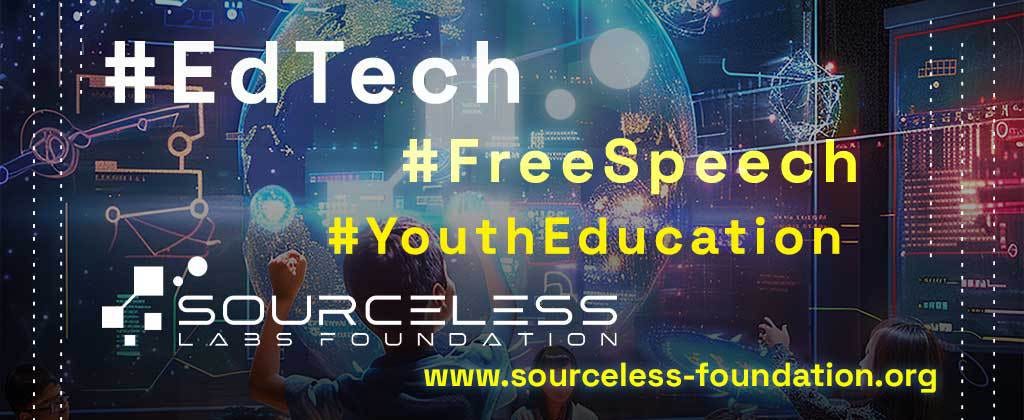Web3, EdTech, and Free Speech: A New Era for Youth Education

Web3, the next generation of the internet, as it’s called, introduces a decentralized framework that has already made a big impact on how we view and approach education. Stepping away from the traditional client-server model, Web3 enables peer-to-peer interactions, giving users greater control over their data and privacy. This shift could lead to significant improvements in how educational content is delivered and consumed, especially in regions where access to quality education has been historically limited.
One of the most persistent challenges in education today is the disparity in access to learning resources. With Web3 we could democratize education by providing decentralized platforms where learning materials are freely available and accessible to all, irrespective of geographic or economic barriers. This is part of SourceLess Lab Foundation’s (SLF) mission to make Web3 communities more inclusive, enabling people from anywhere in the world to benefit from these technologies.
This could drastically reduce the number of children without access to education, which, despite dropping from 378 million in 2000 to 258 million in 2018, remains a critical global issue.
EdTech and Web3: The Future of LearningThe fusion of Web3 with EdTech creates new ways for learning. EdTech platforms powered by Web3 can offer more personalized, immersive, and engaging learning experiences. For instance, blockchain technology can be used to create tamper-proof records of academic achievements, which students can carry throughout their lives, ensuring their qualifications are recognized globally. Additionally, decentralized autonomous organizations (DAOs) can facilitate collaborative learning environments where students and educators collectively decide on the curriculum and teaching methods.
However, the transition to Web3 in education is not without its challenges. One of the significant hurdles is the lack of structured, beginner-friendly pathways for learning Web3 technologies. Current educational resources tend to cater primarily to early adopters, leaving a gap for those who are new to the space. We are working towards creating more accessible educational programs that guide learners from the basics of Web3 to more advanced concepts.
The Role of Free Speech in Web3 EducationWeb3’s decentralized nature also has profound implications for free speech in education. Traditional educational institutions often operate under centralized control, which can lead to censorship or biased dissemination of information. Web3, by contrast, promotes a more open and transparent exchange of ideas, where information is not controlled by a single entity. This can empower students and educators to explore a wider range of perspectives to prioritize critical thinking and innovation.
Moreover, as Web3 platforms are resistant to censorship, they provide a safe space for individuals to express their thoughts and ideas without fear of reprisal. This is particularly important for young people who are increasingly using digital platforms to engage in social and political discourse. By supporting free speech, Web3 can help cultivate a generation of critical thinkers who are not only consumers of information but also contributors to global knowledge.
Addressing the Challenges: The Need for Structured Learning PathwaysWhile there’s so much potential of Web3 and EdTech to transform education, there are also major issues that need to be addressed. For example, the abundance of information available online can be overwhelming, making it difficult for learners to find reliable and relevant content. This challenge is even more pronounced in the context of Web3, where the content is less structured compared to traditional educational resources.
SourceLess Labs Foundation is addressing these challenges by developing educational programs that are not only engaging but also structured to meet the needs of a diverse audience. These programs emphasize the practical applications of Web3 technologies, ensuring that learners understand the real-world implications of what they are studying. By providing clear and realistic pathways to job opportunities, SLF aims to motivate more people to engage with Web3 and pursue careers in this emerging field.
The Future: A Collaborative and Inclusive ApproachThe future of education lies in a collaborative and inclusive approach where technology is used as a tool to empower learners from all walks of life. SourceLess Labs Foundation’s vision for Web3 education is one where everyone, regardless of their background, has the opportunity to learn, grow, and contribute to the global community. By addressing the inefficiencies of the current educational system and leveraging the strengths of Web3, we can create a better and more accessible education in the future.
Besides the gaining knowledge aspect, for the younger generations, the integration of Web3 with EdTech presents an opportunity to also learn to be part of a global movement towards greater inclusivity, transparency, and free speech. With organizations like SourceLess Labs Foundation continuing to innovate and expand access to Web3 education, the potential for positive change in the world of learning is immense.
Web3, EdTech, and Free Speech: A New Era for Youth Education was originally published in Coinmonks on Medium, where people are continuing the conversation by highlighting and responding to this story.
